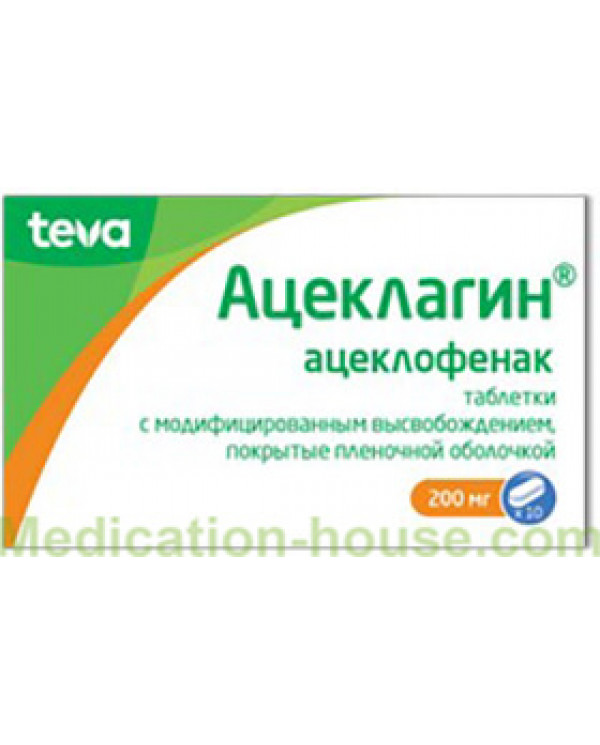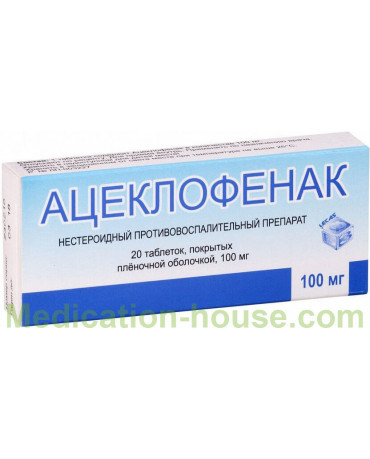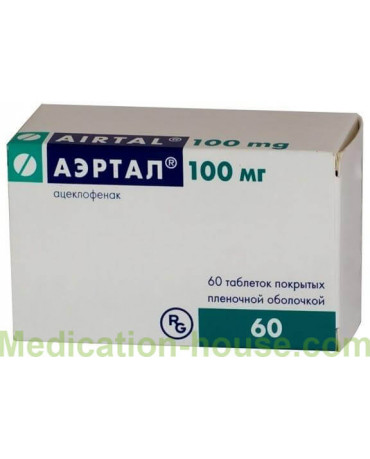Aceclagin instruction
You can buy Aceclagin here
Indications
- Relief of inflammation and pain in lumbago, toothache, scapulohumeral periarthritis, rheumatic soft tissue damage, for the symptomatic treatment of rheumatoid arthritis, osteoarthritis and ankylosing spondylitis.
- Symptomatic therapy, reduction of pain and inflammation at the time of use, does not affect the progression of the disease.
- Dysmenorrhea.
Contraindications
- Hypersensitivity to aceclofenac or auxiliary components of Aceclagin;
- bronchospasm, rhinitis or urticaria after taking acetylsalicylic acid or other NSAIDs in history (complete or incomplete intolerance syndrome of acetylsalicylic acid - rhinosinusitis, urticaria, nasal mucosa polyps, bronchial asthma);
- erosive and ulcerative lesions of the mucous membrane of the gastrointestinal tract (GIT) in the acute phase (including ulcerative colitis, Crohn's disease);
- gastrointestinal bleeding or suspicion of it;
- severe heart failure (II-IV class according to the classification of the New York Heart Association), coronary heart disease, diseases of the peripheral arteries and / or arteries of the brain;
- the period after coronary artery bypass surgery;
- severe liver failure or liver disease in the active stage;
- severe renal failure (creatinine clearance <30 ml / min), progressive kidney disease, confirmed hyperkalemia;
- violations of blood formation and coagulation;
- pregnancy and breastfeeding period;
- children's age up to 18 years.
Carefully
A history of liver, kidney and gastrointestinal diseases, bronchial asthma, hypertension, decreased blood volume (including after extensive surgical interventions), coronary heart disease, chronic renal and hepatic and heart failure, creatinine clearance less than 60 ml / min. history of gastrointestinal ulcers, Helicobacter pylori infection, dyslipidemia / hyperlipidemia, diabetes mellitus, smoking, old age, prolonged use of NSAIDs, severe somatic diseases, alcoholism.
Pregnancy
Use of the drug Aceclagin contraindicated in pregnancy. Information about the use of aceclofenac during pregnancy is not available. Inhibition of prostaglandin synthesis may adversely affect the course of pregnancy and / or the development of the embryo / fetus.
During the third trimester of pregnancy, all prostaglandin synthesis inhibitors:
- having cardiopulmonary toxicity, can cause premature closure of the Botallova duct with the development of pulmonary hypertension;
- can cause impaired renal function of the fetus, which can progress to renal failure in combination with polyhydramnios.
In late pregnancy
- Aceclagin may affect the duration of bleeding due to antiplatelet effect, which can develop even after the use of very low doses;
- the drug can suppress uterine contractions, leading to delayed labor or prolonged labor.
Breastfeeding period
Aceclagin should not be taken during breastfeeding. Data on the allocation of aceclofenac with human milk are not available. In preclinical studies with the introduction of radioactive 14C-aceclofenac, no significant transfer of radioactivity into milk was observed.
Fertility
Non-steroidal anti-inflammatory drugs (NSAIDs) can affect fertility and are not recommended for use by women who are planning a pregnancy.
Composition
Active ingredient: aceclofenac.
Product form: modified release tablets, film-coated 0.2 g №10.
Mode of application
Inside Tablets should be swallowed whole, drinking plenty of water. The recommended daily intake for adults is 200 mg in a single dose (1 tablet per day).
Interactions
With the exception of simultaneous use with warfarin, research on drug interactions has not been conducted.
Aceclofenac is metabolized by the CYP2C9 isoenzyme; In vitro data shows that aceclofenac may be an inhibitor of this enzyme. Thus, the risk of pharmacokinetic interaction is possible when taken simultaneously with phenytoin, cimetidine, tolbutamide, phenylbutazone, amiodarone, miconazole, and sulfaphenazole. As in the case of other NSAIDs, the risk of pharmacokinetic interaction with other drugs that are eliminated from the body by active renal secretion, such as methotrexate and lithium drugs, increases. Aceclofenac is almost completely bound to plasma albumin and, therefore, there is the possibility of interaction by the type of crowding with other drugs that bind to proteins.
The following is class-specific information for NSAIDs:
Methotrexate. NSAIDs inhibit tubular secretion of methotrexate; moreover, a slight metabolic interaction can be observed, which leads to a decrease in the clearance of methotrexate. Therefore, when using high doses of methotrexate, the use of NSAIDs should be avoided.
Preparations of lithium and digoxin. Some NSAIDs inhibit renal clearance of lithium and digoxin. which leads to an increase in serum concentration of both substances. Co-administration should be avoided if lithium and digoxin concentrations are not frequently monitored.
Anticoagulants. NSAIDs inhibit platelet aggregation and damage the gastrointestinal mucosa, which can increase the effect of anticoagulants and increase the risk of gastrointestinal bleeding while taking anticoagulants. Joint use of aceclofenac and oral anticoagulants of the coumarin group, ticlopidine and thrombolytic agents should be avoided if careful monitoring of the patient's condition is not carried out.
Antiplatelet agents and selective serotonin reuptake inhibitors (SSRIs) when used together with NSAIDs may increase the risk of gastrointestinal bleeding.
Cyclosporine, tacrolimus. While taking NSAIDs with cyclosporine or tacrolimus, the risk of increased nephrotoxicity should be considered due to the reduced formation of renal prostacyclin. Therefore, while taking at the same time should be carefully monitored indicators of renal function.
Other NSAIDs. At the same time taking acetylsalicylic acid or other NSAIDs may increase the incidence of side effects, so care should be taken.
Glucocorticosteroids (GCS). The risk of ulcers or gastrointestinal bleeding increases.
Diuretics. Aceclofenac, like other NSAIDs, can inhibit diuretic activity, can reduce the diuretic effect of furosemide and bumetanide and the antihypertensive effect of thiazides. Simultaneous use with potassium-sparing diuretics can lead to an increase in serum potassium. When applied simultaneously with potassium-sparing diuretics, control of potassium in blood serum is necessary. Aceclofenac did not affect blood pressure control when used in combination with bendrofluazide, although interactions with other diuretics cannot be ruled out.
Antihypertensive drugs. NSAIDs can also reduce the effect of antihypertensive drugs. Combined angiotensin-converting enzyme (ACE) inhibitors or angiotensin II receptor antagonists and NSAIDs can lead to impaired renal function. The risk of acute renal failure, which is usually reversible, may increase in some patients with impaired renal function, for example, in the elderly or in dehydration. Therefore, when used in conjunction with NSAIDs, caution should be exercised. Patients should consume the required amount of fluid and be under appropriate supervision (control of renal function at the beginning of joint use and periodically during treatment).
Hypoglycemic agents. Clinical studies show that diclofenac can be used in conjunction with oral hypoglycemic agents without affecting their clinical effect. However, there are separate reports of hypoglycemic and hyperglycemic effects of Aceclagin. Thus, when taking aceclofenac, you should correct the dose of drugs that can cause hypoglycemia.
Zidovudine. At the same time taking NSAIDs and zidovudine increases the risk of hematological toxicity. There is evidence of an increased risk of hemarthrosis and hematomas in HIV-positive (human immunodeficiency virus) patients with hemophilia who receive zidovudine and ibuprofen.
Side effects of Aceclagin
The following are the adverse events reported in clinical studies and in post-marketing surveillance.
The incidence of adverse events is classified as follows: very often (> 1/10); often (from> 1/100 to <1/10); infrequently (from> 1/1000 to <1/100), rarely (from> 1/10000 to <1/1000), very rarely (<1/10000).
From the side of blood and lymphatic system: rarely - anemia; very rarely - inhibition of bone marrow functions, granulocytopenia, thrombocytopenia, neutropenia, hemolytic anemia.
On the part of the immune system: rarely - anaphylactic reactions, including shock, hypersensitivity.
On the part of metabolism and nutrition: very rarely - hyperkalemia, weight gain.
On the part of the psyche: very rarely - depression, unusual (atypical) dreams, insomnia.
On the part of the nervous system: often - dizziness; very rarely - paresthesia, tremor, drowsiness, headache, dysgeusia (taste perversion).
On the part of the organ of vision: rarely - visual impairment.
From the organ of hearing and the labyrinth: very rarely - vertigo, tinnitus.
Cardiac: rarely - heart failure; very rarely - rapid heartbeat.
From the side of the vessels: rarely - increase in blood pressure, worsening of the course of arterial hypertension; very rarely - flushing of the skin, "hot flushes" (short-term sensation of heat, accompanied by sweating), vasculitis.
On the part of the respiratory system, chest organs and mediastinal organs: rarely - shortness of breath; very rarely - bronchospasm.
On the part of the gastrointestinal tract: often - dyspepsia, abdominal pain, nausea, diarrhea; infrequently - flatulence, gastritis, constipation, vomiting, ulceration of the oral mucosa; rarely - melena, ulceration of the mucous membrane of the gastrointestinal tract, hemorrhagic diarrhea, hemorrhage of the mucous membrane of the gastrointestinal tract; very rarely - stomatitis, vomiting of blood, perforation of the intestines, worsening of the course of Crohn's disease and ulcerative colitis, pancreatitis.
On the part of the liver and biliary tract: often - increased activity of "liver" enzymes: very rarely - damage to the liver (including hepatitis), increased activity of alkaline phosphatase.
From the skin and subcutaneous tissue: infrequently - itching, rash, dermatitis, urticaria; rarely, angioedema; very rarely - purpura, eczema, severe reactions from the skin and mucous membranes (including Stevens-Johnson syndrome and toxic epidermal necrolysis).
In some cases, serious skin and soft tissue infections were observed when taking NSAIDs during chickenpox.
On the part of the kidneys and urinary tract: infrequently - an increase in the concentration of urea and creatinine in the blood serum; very rarely - nephrotic syndrome, renal failure.
Systemic abnormalities and complications at the injection site: very rarely - edema, fatigue, muscle spasms of the lower extremities.
If the patient noted a worsening of any of the listed adverse events or the occurrence of an undesirable phenomenon that is not indicated in this instruction, he should contact the attending physician.
Special instructions
It is necessary to avoid simultaneous administration of the drug Aceclagin and other NSAIDs, including selective cyclooxygenase-2 inhibitors (COX-2).
Adverse events can be minimized by applying the minimum effective dose and reducing the duration of treatment needed to control the symptoms.
Effect on the digestive tract
Bleeding, ulcers or perforation of the gastrointestinal tract with a fatal outcome were observed when taking any NSAIDs at any time of treatment, as with the presence of relevant symptoms and the presence of serious gastrointestinal diseases in history (peptic ulcer and Crohn's disease, ulcerative colitis, etc.). and without them. The risk of bleeding, ulceration and perforation of the gastrointestinal tract increases with an increase in the dose of NSAIDs in patients with a history of ulcer disease, especially if it was accompanied by bleeding or perforation, as well as in elderly patients. These patients should take the minimum effective dose of the drug. Consideration should be given to the use of combination therapy with the use of protectors (for example, misoprostol or proton pump inhibitors). Such treatment is necessary for patients who take small doses of aspirin or other drugs that adversely affect the state of the gastrointestinal tract.
Patients with diseases of the gastrointestinal tract, including the elderly, should report any unusual symptoms associated with the gastrointestinal tract (especially bleeding), including during the initial administration of the drug. Particular caution should be exercised in patients taking drugs at the same time that may increase the risk of bleeding or ulcers, such as systemic corticosteroids, anticoagulants (such as warfarin), selective serotonin reuptake inhibitors or antiplatelet agents (such as acetylsalicylic acid).
If gastrointestinal bleeding or ulcers occur in patients taking Aceclagin, treatment should be canceled.
Cases of medical pancreatitis are rare. However, cases of pancreatitis have been reported in connection with NSAIDs.
Effect on the cardiovascular and central nervous system
Patients with arterial hypertension and / or mild to moderate congestive heart failure require appropriate monitoring, since fluid retention and edema are associated with NSAIDs. Aceclofenac is structurally close to diclofenac, has a similar metabolism. For diclofenac, there is evidence of an increased risk of thromboembolic complications (for example, myocardial infarction or stroke, in particular, with long-term treatment with high doses). There is also an increased risk of developing acute coronary syndrome associated with taking aceclofenac. Patients with chronic heart failure (Class I according to the New York Heart Association classification) and patients with risk factors for developing complications of the cardiovascular system (for example, hypertension, diabetes, smoking) should begin treatment with aceclofenac only after a weighted decision of a doctor. Risks of the cardiovascular system may depend on the dose and duration of treatment, therefore, the drug should be prescribed in the minimum effective dose and for the shortest possible period of time.
Impact on the liver and kidneys
NSAIDs can cause a dose-dependent decrease in the formation of prostaglandins and acute renal failure. The importance of prostaglandins for ensuring renal blood flow should be considered when taking the drug Aceclagin in patients with impaired heart, kidney or liver function, in patients receiving diuretics, or in patients after surgery, as well as in elderly patients. Care should be taken when using the drug Aceclagin in patients with impaired liver and kidney function of mild or moderate severity, as well as in patients with other conditions predisposing to fluid retention in the body. In these patients, the use of NSAIDs can lead to impaired renal function and fluid retention. Patients taking diuretics, those with an increased risk of hypovolemia should also be careful when taking the drug Aceclagin. It is necessary to use the minimum effective dose and regular medical monitoring of renal function. Adverse events of the kidneys are usually resolved after discontinuation of aceclofenac. Acceptance of Aceclagin should be stopped if changes in liver function indicators persist or worsen, clinical signs or symptoms of liver disease develop, or other manifestations occur (eosinophilia, skin rash). Hepatitis can develop without prodromal symptoms.
The use of NSAIDs in patients with hepatic porphyria may trigger an attack.
Hypersensitivity and skin reactions
Like other NSAIDs, aceclofenac can cause allergic reactions, including anaphylactic / anaphylactoid reactions, even if aceclofenac is taken for the first time. Severe skin reactions (some of which can be fatal), including exfoliative dermatitis, Stevens-Johnson syndrome, and toxic epidermal necrolysis, have been seen very rarely after taking NSAIDs. The highest risk of these reactions in patients is observed at the beginning of receiving aceclofenac, and the development of these adverse reactions is observed during the first month of taking aceclofenac. If you experience a skin rash, damage to the oral mucosa or other signs of hypersensitivity, you should stop taking Aceclagin.
In some cases, infections of the skin and soft tissues can occur with chickenpox.
Currently, the role of NSAIDs in worsening the course of these infections cannot be ruled out. Therefore, you should avoid taking the drug Aceclagin ® with chickenpox.
Hematological disorders
Aceclofenac may cause reversible inhibition of platelet aggregation.
Respiratory disorders
Caution must be exercised when taking the drug Aceclagin in patients with bronchial asthma (including in history), since the use of NSAIDs can trigger the development of sudden bronchospasm in these patients.
Elderly patients
Caution must be exercised when taking the drug Aceclagin in elderly patients, since they more often have side effects (especially bleeding and perforation of LCG) while taking NSAIDs. Complications can be fatal. Also, older patients are more likely to suffer from kidney, liver, or cardiovascular diseases.
Long-term use
All patients receiving long-term NSAID treatment should be under close supervision (for example, complete blood count, functional liver and kidney tests).
Due to the antiprostaglandin properties of NSAIDs, caution should be recommended to women taking mifepristone, since when used together with NSAIDs, theoretically, a decrease in the effectiveness of Aceclagin can occur. Clinical significance unknown.
Impact on the ability to drive
You should refrain from driving and practicing other potentially dangerous activities that require high concentration of attention and psychomotor speed, as Aceclagin can cause dizziness and other side effects that can affect these abilities.
Storage conditions
Store at a temperature not higher than 30 ° C.
Terms of sell
You don't need a prescription to buy Aceclagin.



